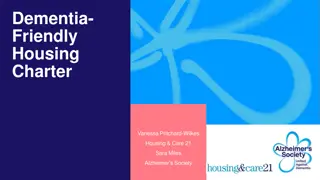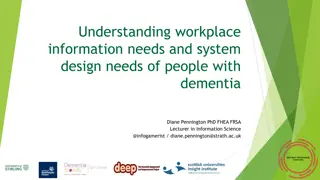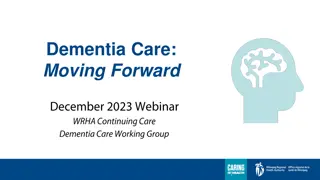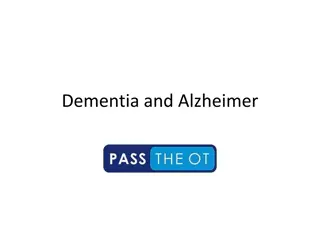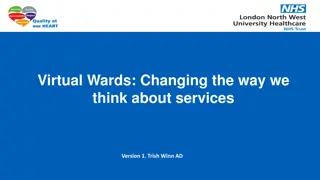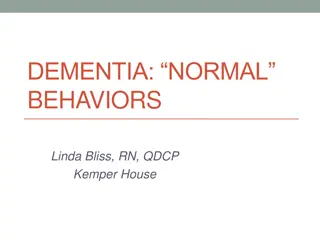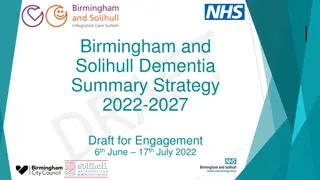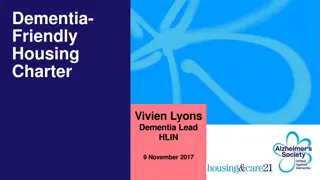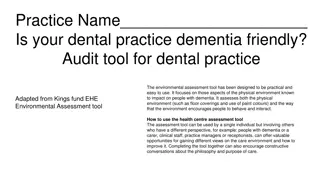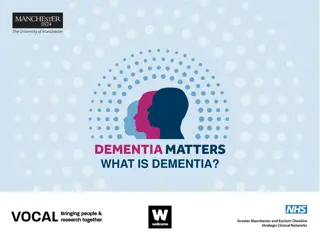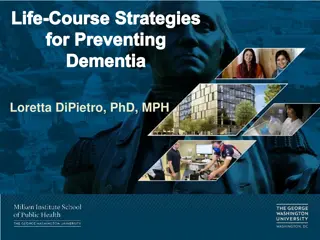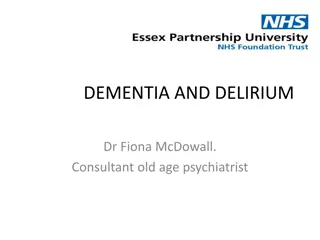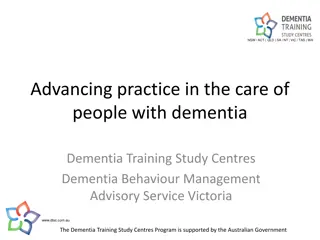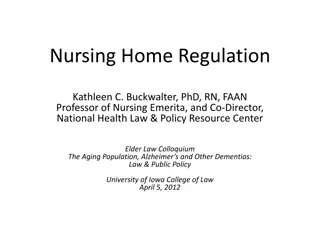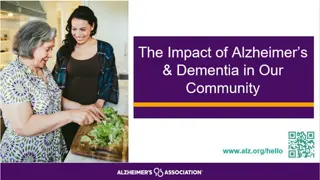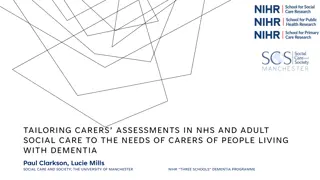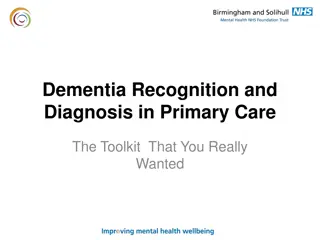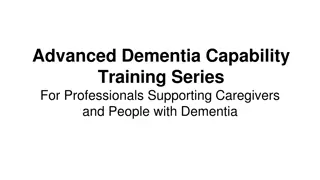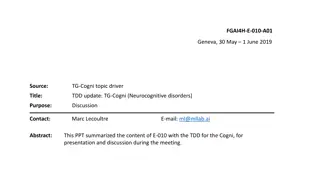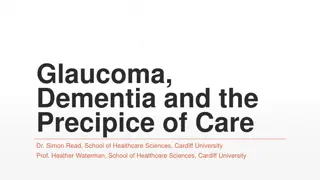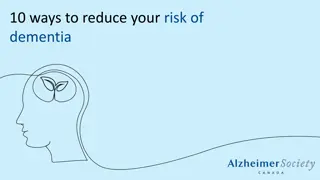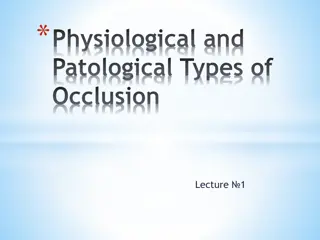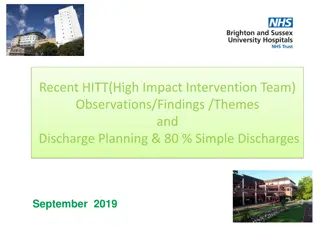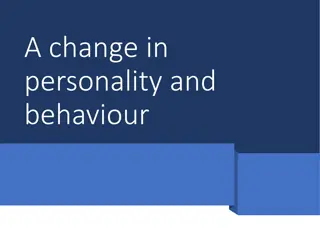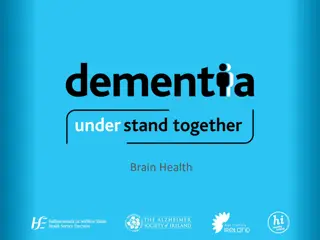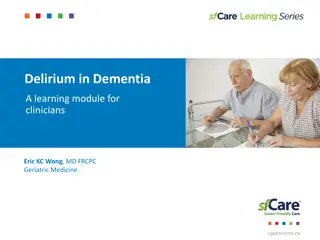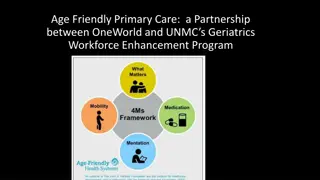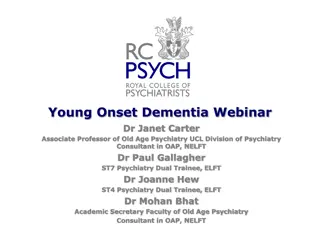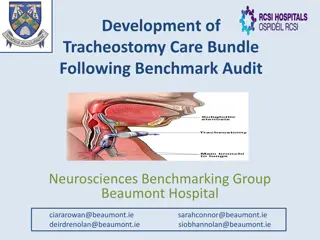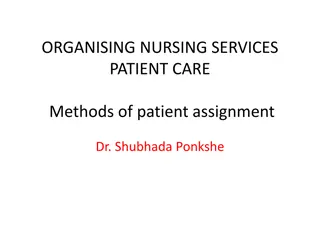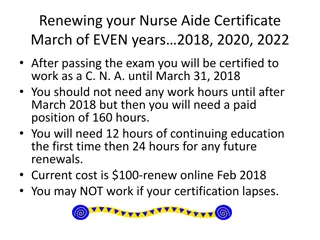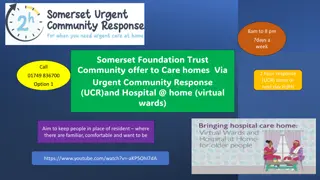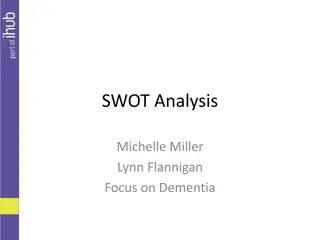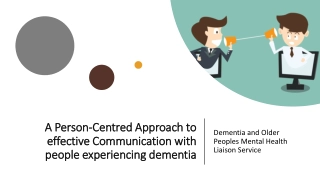Enhancing Dementia Care on General Wards through Bite-Size Teaching
Improving dementia care on general wards through bite-size teaching sessions led by a collaborative team of geriatricians and liaison psychiatry professionals. Addressing staff training needs, identification of triggers, management of challenging behaviors, and enhancing care plans to provide better support for dementia patients.
Download Presentation

Please find below an Image/Link to download the presentation.
The content on the website is provided AS IS for your information and personal use only. It may not be sold, licensed, or shared on other websites without obtaining consent from the author. Download presentation by click this link. If you encounter any issues during the download, it is possible that the publisher has removed the file from their server.
E N D
Presentation Transcript
Bite size teaching to improve dementia care on general wards Liaison Psychiatry for Older people team ( LPOP)& Geriatric Medicine team Presenter: Dr Radhika Oruganti , Consultant Psychiatrist & Dr Fernandez, Consultant Geriatrician
Who was in our team? Joint venture by Geriatricians and Liaison Psychiatry for Older people s (LPOP) team LPOP team: Dr Radhika Oruganti , Dr Rugi Saeed, Stephanie James, Alana Fowler, Lana Garlick, Emma Murdoch, Jade, Katie, Emma Roberts Geriatrics team: Dr Fernandez, Dr O Mahony & East 8 Staff
How we identified our problem A short survey revealed that general medical staff feel they do not have enough training to manage dementia patients when they present with challenging behaviours General ward staff were offered a list of topics - 6 topics chosen by ward staff 1. Behaviour charts Right way of completing them 2. Care Plans What should a care plan look like & Read About Me 3. Wandering behaviour management strategies 4. Communication approaches ( meds compliance, engagement with therapies, redirection and management of unmet needs) 5. Natural waking 6. Identifying carers stress LPOP presenters /trainers allocated Training offered in bite size 15min back to back sessions (30min for communication approaches ) The time in between the sessions used for the taught interventions to be put into practice
List of topics given to ward staff 1. 2. 3. 4. 5. 6. 7. 8. 9. Barbara s Story Behaviour charts Right way of completing them Care Plans What should a care plan look like & Read About Me Mental Health Act and DoLS Validation Therapy How to manage resistance to personal care Oral intake Wandering behaviour management strategies Communication approaches ( meds compliance, engagement with therapies, redirection and management of unmet needs) Natural waking Purposeful activities Pharmacological management of challenging behaviours Identifying carers stress LPOP RAID role and the mental health conditions that we can help with 10. 11. 12. 13. 14.
What change ideas did we apply? Enhance staff training in identification of triggers and approaches to manage challenging behaviours Improve completion of care plans Accurate completion of behaviour charts as an aid to identify triggers and approaches that help the patient Engagement of senior ward staff- Consultants and Ward managers Ward staff keen to learn LPOP took training to their door step Trainings sessions offered in bitesize Training topics chosen by ward staff LPOP - team work and flexibility LPOP HCSW presence on East 8 during these sessions
How we measured our change LPOP met with Geriatrics team to discuss the training goals prior to the start of the programme Pre and post training feedback for each teaching session was collected Scrutiny of Case notes for completed care plans, behaviour charts and Read about me document Pre and post training programme Post programme meeting to seek feedback about the training as well as the notable changes in patient care on the ward.
Results- Staff feedback Pre and post training programme STAFF CONFIDENCE IN USING NON PHARMACOLOGICAL APPROACHES Pre I feel confident in using non-pharm approaches when a patient has behave symptoms STAFF CONFIDENCE IN COMPLETING BEHAVIOUR CHARTS Post I feel confident in using non-pharm approaches when a patient has behave symptoms 9 8 6 Pre I feel confident in completing behaviour charts STAFF CONFIDENCE IN EXPLORING COMMUNICATION DIFFICULTIES Post I feel confident in completing behaviour charts 1 1 7 6 STRONGLY DISAGREE DISAGREE NEUTRAL AGREE STRONGLY AGREE 5 3 2 Pre I feel confident in exploring needs of patients who have difficulties communicating due to a CI 1 1 Post I feel confident in exploring needs of patients who have difficulties communicating due to a CI STRONGLY DISAGREE DISAGREE NEUTRAL AGREE STRONGLY AGREE 7 6 5 4 2 1 STRONGLY DISAGREE DISAGREE NEUTRAL AGREE STRONGLY AGREE
Individual teaching session feedback Care plans 6 5 4 Carer stress 3 Pre my ability to apply knowledge of this topic in practice is satisfactory Post my ability to apply knowledge of this topic in practice is satisfactory 2 9 8 1 7 Pre my ability to apply knowledge of this topic in practice is satisfactory Post my ability to apply knowledge of this topic in practice is satisfactory 6 0 5 4 3 2 1 0
Completing Behaviour charts 6 5 4 Wandering behaviours 3 Pre my ability to apply knowledge of this topic in practice is satisfactory Post my ability to apply knowledge of this topic in practice is satisfactory 2 4 1 3.5 3 0 Pre my ability to apply knowledge of this topic in practice is satisfactory Post my ability to apply knowledge of this topic in practice is satisfactory 2.5 2 1.5 1 0.5 0
Communication Approaches 9 8 7 6 Pre my ability to apply knowledge of this topic in practice is satisfactory Post my ability to apply knowledge of this topic in practice is satisfactory Natural waking 5 4 3 6 2 5 1 Pre my ability to apply knowledge of this topic in practice is satisfactory Post my ability to apply knowledge of this topic in practice is satisfactory 0 4 3 2 1 0
Best outcomes Shift in culture Improved staff confidence and morale Staff spending more time with patients Increased awareness and better management of patients with challenging behaviours
Where are we now and what are our future plans? Implementing training sessions regularly Implement similar projects on other wards Modelling approaches Signpost staff to available training resources
Any Questions Thank you




